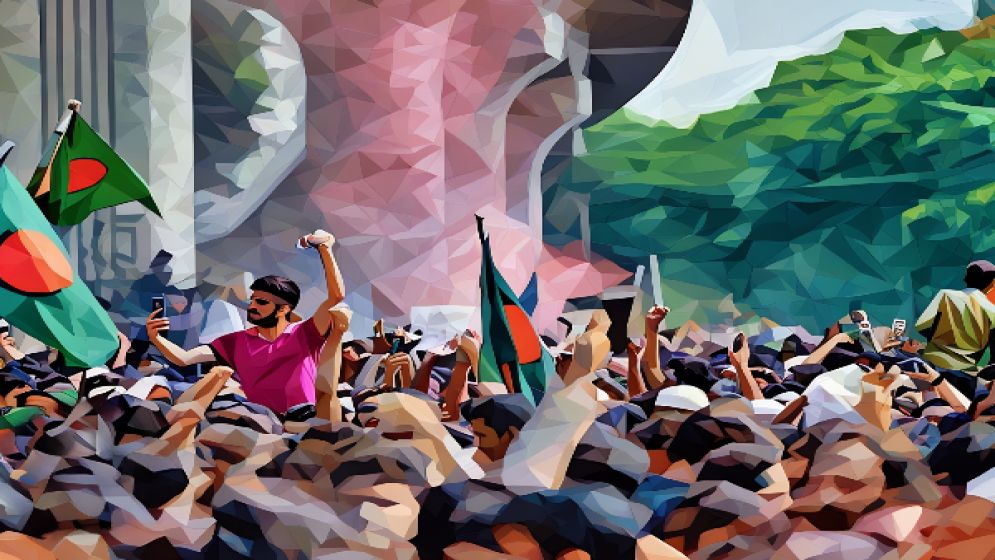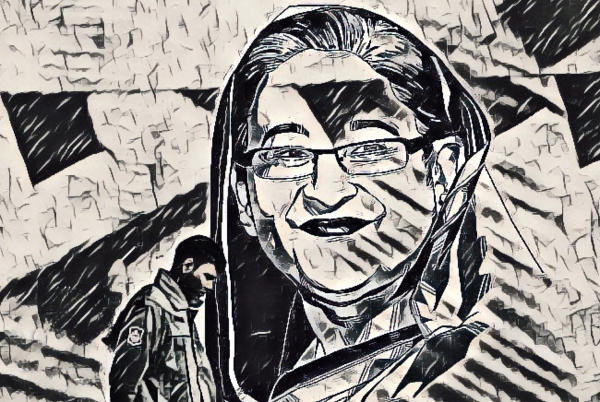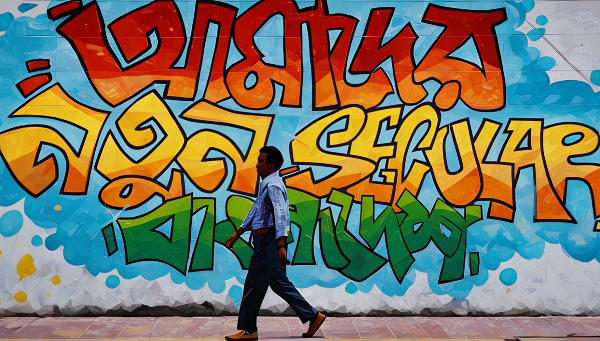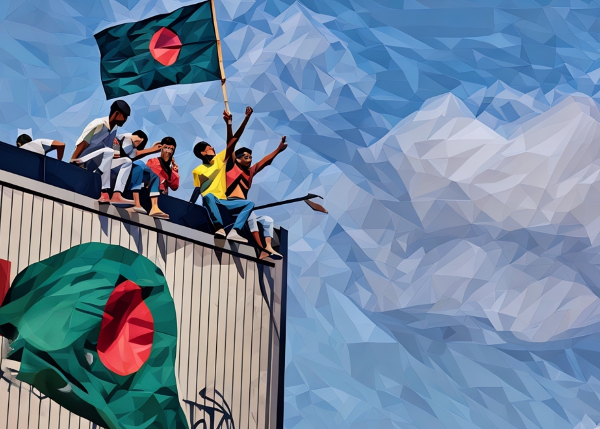The July uprising proclamation: What’s at stake and what needs to be said

The image of Sheikh Hasina on the metro rail pillar at Dhaka University, where people threw mud and dirt and draped a garland of shoes around it on the 5th, became a powerful symbol of Bangladesh’s July uprising.
When news spread that this vibrant image—now a key symbol of the revolt—was being abruptly erased, it triggered a massive public outcry in the days that followed.
However, this discussion was overshadowed when, nearly five months after the uprising, on December 31, the student leadership was poised to announce the proclamation of Bangladesh’s first-ever Gen-Z uprising.
This news sparked widespread debates across the country, with social media buzzing with speculation and conversation.
Later that evening, Shafiqul Alam, the press secretary to the Chief Advisor, clarified that the proclamation would come from the interim government, rather than the student-led pressure groups, but it would not happen on December 31.
The issue of officially declaring the "July uprising" has been a subject of ongoing discussion. Immediately after the uprising, many called for an official declaration of it.
Personally, I have addressed this issue in various forums and talk shows.
But as the unity of the movement began to weaken, and power struggles between different factions became more apparent, it was inevitable that the announcement of a proclamation of the popular uprising would stir up significant reactions.
If we analyze the politics of historical narration in Bangladesh, we find that its historical narrative has played a role in strengthening the fascist tendencies of the Awami League.
According to this narrative, the history of the Bengali people is said to have begun in 1947. Following this, the people’s war of 1971 was entirely claimed by the Awami League as a party achievement, and in doing so, it helped facilitate the establishment of fascism.
The famous words of Umberto Eco, "Tradition is older than fascism," ring especially true in the case of Bangladesh.
Indian Bengali nationalist intellectuals have framed the country’s history and heritage in such a way that the Awami League has easily constructed a historical justification for the rise of fascism.
Against this backdrop, the student-led and public uprising against this distorted narrative of the Liberation War has opened up a path for national liberation.
To seize this opportunity, today’s youth—who are the architects of the present moment—have created a new history with their own lives.
As a symbol of this, the proclamation of the popular uprising, though delayed, is going to be made.
Through this proclamation, a process of reinterpreting the entire history of the national liberation struggle will begin, framed in the context of 2024.
This shift in historical direction will have a profound impact on national politics as a whole. From this perspective, this event can be understood as a paradigm shift in the politics of Bangladesh.

Context of the
new proclamation
It is important to elaborate on why I am making this statement.
First, a group of intellectuals attempted to present this uprising as a revolution. The opposition parties that had played a role in it—particularly the largest party in Bangladesh, the BNP—had spent the last 16 years fighting to restore democracy and protect voting rights.
The true nature of Awami fascism became more apparent to the nation as the extreme repression and torture against the opposition unfolded.
Despite having massive popular support and a large number of activists, BNP never resorted to violent confrontation with the fascist regime.
Instead, with the support they had, they always demanded their rights peacefully and democratically. However, their Gandhian approach to peaceful demands was mocked by Awami League leaders and activists.
At the same time, there was dissatisfaction among the public with certain policies and strategies of the BNP. Due to the one-sided propaganda by the Awami League, the new generation found it hard to associate the BNP with democracy and public welfare.
However, the people were yearning to be freed from the endless oppression of the Awami League.
The BNP leaders, under whose leadership the people were ready to fight, were kept out of the public eye by the Sheikh Hasina government.
Khaleda Zia was imprisoned, and Tarique Zia lived in exile in London. As a result, despite repeated efforts, BNP was unable to organize a popular movement.
Just before the January 7, 2024 elections, when BNP held a rally in Dhaka to demand free and fair elections, the government carried out a brutal crackdown during the rally, arresting thousands of leaders and activists. Sheikh Hasina proceeded with a fraudulent election and seized power.
Subsequently, the imprisoned leaders were slowly released, and they began reorganizing the party and preparing for another movement.
The large number of activists who had been in hiding were now getting ready to rejoin the movement.
Their choices were clear: either face arrest or fight to overthrow the government through an uprising. Thousands of cases had been filed against them, and for many, the movement became their best option.
It was during this time, when the student-led anti-inequality movement began to gain momentum, that the movement achieved its final victory between mid-July and August 5.
On August 5, people from all opposition parties and various sections of society took to the streets, and the fascist regime of Sheikh Hasina was overthrown. Hasina fled to India seeking refuge.
Following this, a debate erupted over the stakes of the movement. The “controversial” mastermind behind it was revealed. The government formed as a result of the opposition parties and the student-public uprising was named the interim government.
However, some believed that this would be a revolutionary government, one that would abolish everything, starting with the constitution, and completely rebuild the country.
But in reality, they took an oath under the old constitution. The army, police, and bureaucracy remained unchanged, with only a few individuals replaced.

Why the
proclamations is important now
Initially, the opposition parties attempted to include their loyalists in the new government. While they had some early success, the leadership eventually came under the control of the students.
This shift created tensions between the established political parties and the student movement on various issues.
Many of the students involved, who were also linked to opposition politics, had hidden their party affiliations. As the student leadership began asserting its dominance, these students resisted fully accepting their control.
Over time, the students realized that maintaining power in this manner was unsustainable. National unity became crucial. This unity was swiftly formed in opposition to Indian propaganda.
The students soon came to understand that their vision of a complete revolutionary transformation was not practical.
They recognized that, without acknowledging the history of this popular uprising, their very existence would be diminished.
On the other hand, the new generation’s dream of a citizen-driven, institutional democracy could only be realized through political parties and a government elected by the people.
Thus, the declaration of a document outlining the spirit in which future change and reconstruction would take place became essential to keeping the uprising relevant.
This proclamation would serve as a reminder to future elected leaders, holding them accountable. It would be difficult for any new political force to ignore this declaration, which was won through the sacrifice of thousands of martyrs and wounded individuals.
In the future, students will also have the chance to position themselves as a political force based on this declaration.
However, a popular uprising is not the same as a political settlement, nor is it a mandate to stay in power. This has become clear to all now.
Politics is essential for remaining in power. Power without politics leads to a fascist tendency, regardless of who holds it.
Therefore, this declaration can be viewed, on one hand, as a paradigm shift in Bangladesh politics. It also stands as proof of the emergence of a new historical authority in 2024.
For future political parties, it will be a significant challenge to see who can genuinely embody this new authority.

What the
proclamation should encapsulate
When an event or incident occurs, the subsequent actions in the social sphere are often referred to as the politics of interpretation, or the politics of hermeneutics.
The future impact of this preamble will depend on how well it encapsulates the collective or plural subjectivity of the uprising.
It hinges on how well the collective spirit of the people is reflected in it. The truthfulness and poetic spirituality of this declaration will ultimately determine its long-term effectiveness.
If the spirit of the people's liberation—one that inspired them to dedicate their lives—is not captured, and if the collective solidarity that emerged from it is not embraced, the uprising's essence, which lacked a formal language but was expressed through the flow of the march, will fail to allow for infinite interpretation.
If it fails to encapsulate this essence, it will cease to echo national unity and instead become a tool to further the interests and dominance of a particular group, much like the events following the 1971 declaration.
Those who fought on the battlefield were sidelined, while those who lived in exile in India later reinterpreted the spirit of the Liberation War.
They framed it as a testament to the spirit of the majority Muslim population and presented 1971 as a document of Indian subjugation.
Thus, the most significant challenge for this proclamation is that it must provide space for the collective voice of the sacred spirit to resonate.
It must accommodate everyone. Its abstraction is vital so that room is left for creative interpretation. If the declaration is too rigid, it will stifle the diversity of voices and the multiple political spirits that need to be heard. Its moral and spiritual beauty is what will give it enduring power.
On the other hand, if this declaration prioritizes any specific ideology or is used as a tool to shape the thoughts and political narrative of a particular group, it would be highly unfortunate.
Once interpreted from various perspectives, its true essence or meaning will inevitably emerge. Therefore, if a delayed proclamation is made to emphasize a particular ideology instead of fostering openness, it will carry no real weight in national life beyond a few pages of paper.
In contrast, the unity formed within the movement, the spirit it embodies, and the new Bangladesh we are witnessing—through the involvement of the people and all opposition parties—draw their strength from truth. It is much like poetry.
A beautifully crafted poem, though pleasing to the ear, may not always soothe the heart, but a few honest lines can sometimes stir deep emotions.
When the reader connects with these lines, they instantly resonate with their truth and spirituality. Similarly, a national proclamation must demand this kind of poetic truthfulness.
Thus, while recognizing the historical importance of this proclamation, it must be emphasized that its moral clarity and simple abstraction are what will breathe life into it. These qualities have the potential to shape the politics of the future.
—--
Rezaul Karim Rony is a writer and thinker. He is the editor of Joban magazine

